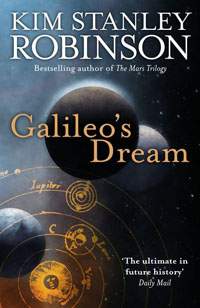By Kim Stanley Robinson

From what I know of the life of Galileo the research for this book is substantial, in-depth and accurate to a fault, and it is put to very effective use crafting the history of a man afflicted by his own genius. A drinker and womaniser, he was sarcastic and rude to those he considered less than himself - which was almost everybody - and obsequious and fawning to his patrons and those of power and wealth. Arrogant, a bully who was prone to violence and terrible mood-swings, in ill health most of the time with a constantly rupturing hernia, often lapsing into blackouts he is nevertheless someone you cheer for as he runs experiment after experiment in search of answers to the fundamental questions of the universe.
Then comes the sci-fi.
It is testament to Robinson's powers of story-telling that he manages to seamlessly weave the story of this mans life with tales of travel through time and space. During these 'episodes' Galileo learns about the future-science he will never get to see, he also experiences major criticism about his personal life, the way he ill-treats his mother, his mistress, his daughters, his servants - everybody in fact - and also how he has never learned to appreciate the life of incredible privilege he has fallen into. I'm still at a loss as to why this device was used to be fair, Galileo's life story is way more interesting than a bunch of lightly sketched human colonists noodling around about a mcguffin alien life form, but if you think of it as a new way of judging the man and his actions from a modern perspective then it maybe works, maybe does not. Personally I think trying to compare 17th century morals and ethics against modern sensibilities is almost always going to make them come up short.
The big problem with Galileo's Dream however is more fundamental than that. In large chunks during the time-travelling sections it is, frankly, boring. The science is often discussed as if in a university lecture theatre, only without the laughs, and the philosophy isn't very interesting to start with so the novel slowly but inevitably begins to disappear up it's own backside until you neither understand what's going on, nor care to find out, until you are unceremoniously dumped back in 17th century Italy and can rekindle some interest in the goings-on.
Robinson's books are often literary but in the past have managed to combine this with gripping stories, particularly The Mars Trilogy, but Galileo's Dream, like others of his recent work, doesn't really manage to pull off the same trick. While the historical sections are without doubt a triumph, beautifully capturing the mania and eccentricities of the great man, his joy in discovery and his depression in adversity, the sci-fi sections are dull and lifeless by comparison, the ideas are interesting but without depth and the people and places are such light brush strokes that they are instantly forgettable.
I fully understand why it made it onto the ACCA shortlist, it's a bravura attempt at a kind of literary-science-fiction-biography, lovely prose and extremely clever to-boot, but ultimately it's not a book you'll warm to - unless I'm just not smart enough to get it.
Galileo's Dream is published by Gollancz and is available from Play.com, Blackwell and all good book stores.
There is a decent reference website for Kim Stanley Robinson.